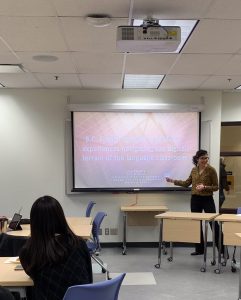Over the past school year, I have had the opportunity to work on a small Teaching and Learning Enhancement Fund (TLEF) project dedicated to developing French teacher candidates understandings of technology and open education resources. Our team has conducted workshops, developed online resources on Scarfe Digital Sandbox and worked alongside French teacher candidates. As part of this small TLEF, I also had the pleasure of attending and presenting at the WestCast 2019 conference to discuss this project and its preliminary findings.
WestCast (Western Canadian Association for Student Teaching) is a conference that brings pre-service teachers, students, graduate students, teacher educators, and practicing teachers together to discuss various topics in education, and this year the conference was held at the University of Calgary. It was a great way to learn about different pedagogical approaches across different subject matters. In addition, it allowed me to network and meet fellow scholars and practitioners in the field.

At the conference, I had the opportunity to see one of our own teacher candidates in the French BEd program. This presentation discussed the various ways in which teachers can engage language learners in the classroom through film. The presenter highlighted the importance of teacher reflection, thoughtfulness and objectivity in the classroom and urged language teachers to use films in a meaningful way to introduce students to new vocabulary, culture and themes. The teacher candidates graciously shared a list of online resources used in the French language classroom: Learn French Resources.
Following this presentation, I had the chance to discuss our TLEF project: WestCast 2018 TLEF presentation. I began by discussing the role of technology in the language classroom and its presence within the revised B.C. curriculum. Then I highlighted some findings from data collected via an online questionnaire and a focus group session conducted with the elementary French teacher cohort. Data reveals that teacher candidates recognize the significance of online resources in the language classroom however they need additional opportunities to play with technology and explore online resources before implementing it into their pedagogical practices. Furthermore teacher candidates indicate that they are still unfamiliar with the B.C. Digital literacy framework and copyright standards and therefore require further support in navigating the open education digital terrain. In the remaining months of this project, we will strive to create resources geared to their needs and will work to scaffold French teacher candidates in their efforts to integrate technology and build digital citizenship. I look forward to sharing the projects final findings on the Scarfe Digital Sandbox in addition to the next WestCast 2020 which will be held at the University of British Columbia.
Liza Navarro
PhD Student
Department of Language & Literacy Education
University of British Columbia
Twitter | LLED

